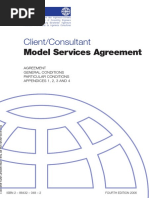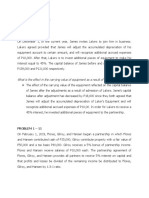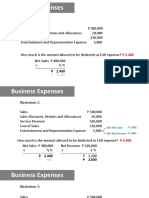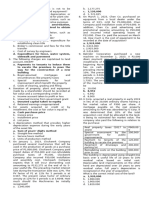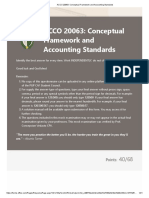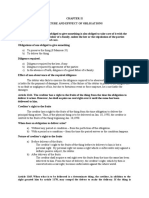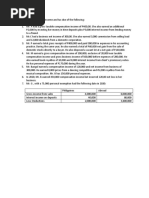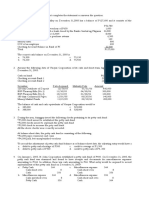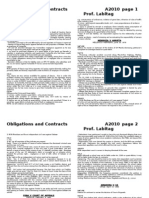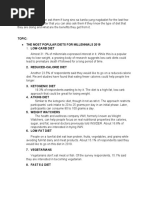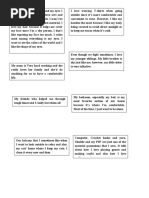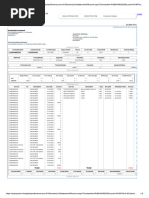0 ratings0% found this document useful (0 votes)
188 viewsContractual) - Negligence in Contracts
Contractual) - Negligence in Contracts
Uploaded by
Allyson Charissa Ansay1) The document discusses the rules around negligence, fraud, and fortuitous events in obligations under Philippine law. It defines the different types of negligence (contractual, civil, criminal) and states that waiver of future fraud is void.
2) It also discusses the diligence required in obligations, noting the level depends on the nature of the obligation, circumstances of the parties, time, and place. In cases of fraud or bad faith, the obligor is liable for all damages.
3) The document defines fortuitous events as events that could not be foreseen or avoided. It establishes the requisites for a fortuitous event to exempt an obligor from liability, such as the event being
Copyright:
© All Rights Reserved
Available Formats
Download as PDF, TXT or read online from Scribd
Contractual) - Negligence in Contracts
Contractual) - Negligence in Contracts
Uploaded by
Allyson Charissa Ansay0 ratings0% found this document useful (0 votes)
188 views3 pages1) The document discusses the rules around negligence, fraud, and fortuitous events in obligations under Philippine law. It defines the different types of negligence (contractual, civil, criminal) and states that waiver of future fraud is void.
2) It also discusses the diligence required in obligations, noting the level depends on the nature of the obligation, circumstances of the parties, time, and place. In cases of fraud or bad faith, the obligor is liable for all damages.
3) The document defines fortuitous events as events that could not be foreseen or avoided. It establishes the requisites for a fortuitous event to exempt an obligor from liability, such as the event being
Original Title
272939789-Articles-1171-1175
Copyright
© © All Rights Reserved
Available Formats
PDF, TXT or read online from Scribd
Share this document
Did you find this document useful?
Is this content inappropriate?
1) The document discusses the rules around negligence, fraud, and fortuitous events in obligations under Philippine law. It defines the different types of negligence (contractual, civil, criminal) and states that waiver of future fraud is void.
2) It also discusses the diligence required in obligations, noting the level depends on the nature of the obligation, circumstances of the parties, time, and place. In cases of fraud or bad faith, the obligor is liable for all damages.
3) The document defines fortuitous events as events that could not be foreseen or avoided. It establishes the requisites for a fortuitous event to exempt an obligor from liability, such as the event being
Copyright:
© All Rights Reserved
Available Formats
Download as PDF, TXT or read online from Scribd
Download as pdf or txt
0 ratings0% found this document useful (0 votes)
188 views3 pagesContractual) - Negligence in Contracts
Contractual) - Negligence in Contracts
Uploaded by
Allyson Charissa Ansay1) The document discusses the rules around negligence, fraud, and fortuitous events in obligations under Philippine law. It defines the different types of negligence (contractual, civil, criminal) and states that waiver of future fraud is void.
2) It also discusses the diligence required in obligations, noting the level depends on the nature of the obligation, circumstances of the parties, time, and place. In cases of fraud or bad faith, the obligor is liable for all damages.
3) The document defines fortuitous events as events that could not be foreseen or avoided. It establishes the requisites for a fortuitous event to exempt an obligor from liability, such as the event being
Copyright:
© All Rights Reserved
Available Formats
Download as PDF, TXT or read online from Scribd
Download as pdf or txt
You are on page 1of 3
fraud.
If there is bad faith, considered
Art. 1171 Responsibility arising from equivalent to fraud. Waiver is void.
fraud is demandable in all obligations. Kinds of negligence accdg to source of
Any waiver of an action for future obligation
fraud is void. (1102a) (1) Contractual negligence (culpa
refers to incidental fraud w/c is employed in contractual) – negligence in contracts
the fulfillment of an obligation. resulting in their breach. Negligence is not a
Incidental fraud – fraud at the time of the source of obligation but rather the contract
performance of the obligation that was entered bet the parties.
Responsibility is demandable in all (2) Civil negligence (culpa aquiliana) –
obligations arising from fraud, you can negligence itself is the source of the
demand for payment for damages. If the obligation. Also called “tort or quasi-delict”.
basis for damages is fraud, the court is not (3) Criminal negligence (culpa criminal) –
given the power to mitigate or reduce the negligence resulting in the commission of a
damages because in fraud there is bad faith crime. The negligent act causing damages
unlike negligence. may produce civil liability or create an action
Waiver – renunciation of right for quasi-delict.
Waiver of an action for future fraud is Ex. Driver of a taxi. (Reckless imprudence –
void. It encourages commission of fraud. To criminal act)
commit acts of bad faith. You can have all three as basis if they are
Waiver of action for past fraud is valid. connected in the same act but you can claim
Because it already happened, considered as only once. Under Art. 2177 of Civil code, it is
an act of generosity. Renounced: the effect of prohibited to recover twice for the same
the fraud, the right to indemnity of the party negligent act.
entitled. When the plaintiff’s own negligence was the
Note: Waiver should be voluntarily signed to immediate and proximate cause of his injury,
be valid. The signee should understand what he cannot recover damages. If his negligence
he/she enters into. is contributory, the immediate and proximate
Art. 1172 Responsibility arising from cause of the injury being the defendant’s
negligence in the performance of lack of due care, the plaintiff may recover
every kind on obligation is also damages but the court shall mitigate the
demandable, but such liability may be damages to be awarded.
regulated by the courts, according to **To be entitled to damages, it is not
the circumstance. required that the negligence of the
Unlike fraud, if there is negligence, the court defendant should be the sole cause of the
may reduce the damages depending upon damage.
the circumstances of each case because Art. 1173 The fault or negligence of
there is no bad faith, no intent to commit this the obligor consists in the omission of
act. that diligence w/c is req’d by the
Negligence is not as serious as fraud nature of the obligation and
because there is no deliberate intention to corresponds w/ the circumstances of
cause injury or damages. the person, of the time and of the
Past negligence, can be subject to waiver. place. When negligence shows bad
An action for future negligence may be faith, the provisions of arts. 1171 and
renounced, as long as it is not considered 2201, par 2, shall apply.
fraud, reckless that would cause damage to If the law or contract does not state
other person, not covered by those requiring the diligence w/c is to be observed in
extraordinary diligence, may be subject to the performance, that w/c is expected
of a good father of a family shall be
req’d. Fortuitous event – event cannot be foreseen,
Fault or negligence – the failure to observe or which though foreseen, is inevitable.
for the protection of the interests of another, Impossible to foresee or impossible to avoid.
that degree of care, precaution and vigilance Essence: consists of being a happening
whereby other person suffers injury. independent of the will of the debtor and w/c
Factors makes the normal fulfillment of the
(1) Nature of obligation obligation.
(2) Circumstances of the person Fortuitous event – Act of man (murder,
(3) Circumstance of time war, fire…)
(4) Circumstances of place
Force majeure – act of God (earthquake,
In contracts and quasi-contracts, the dames
calamities…)
for w/c the obligor who acted in good faith is
Under oblicon, they are identical. Both are
liable shall be those that are the natural and
independent of the will of the obligor.
probable consequences of the breach and
Kinds of Fortuitous events
w/c the parties have foreseen or could have
(1) ordinary fortuitous event – common,
reasonably foreseen at the time the
could reasonably foresee (rain, floods
obligation was constituted.
in davao)
In case of fraud, bad faith, malice or wanton (2) extra-ordinary fortuitous event –
attitude, the obligor shall be responsible for uncommon, could not have possibly
all damages w/c may be reasonably foreseen (earthquake, war, pestilence)
attributed to the non-performance of the Requisites:
obligation. (1) event must be independent of the
Ex. B suffered a heart attack and was human will or at least of the debtor’s
hospitalized for 5 days because of the breach will
by S resulting to loss of 5000 profit and this (2) event could not be foreseen and if
angered the former. If S acted in good faith, foreseen, inevitable
the damage w/c B ought to receive should be (3) event must of such a character as to
the amount of 5000, the profit w/c B failed to render it impossible for the debtor to
realize. comply w/ in a normal manner
If S acted in bad faith, he is also liable to pay (4) the debtor must be from any
for the hospitalization expenses w/c clearly participation in the aggravation or
originated from the breach. injury to the creditor, no negligence in
Kinds of Diligence (hierarchy) the part of the debtor.
(1) Agreement In the absence of any requisites would
(2) in the absence of agreement, required prevent the obligor from being exempt from
by law in the particular case liability.
(3) in the absence of agreement and law, Mere pecuniary inability or poverty, is not an
the diligence of a good father of a excuse for non-fulfillment of the obligation.
family Neither is mere difficulty to foresee an event;
Art. 1174 Except in cases expressly it is different from the impossibility to
specified by the law, or when it is foresee. The event must be unforeseeable or
otherwise declared by stipulation, or if foreseen, must be impossible to avoid.
when the nature of the obligation General rule: A person is not responsible for
requires the assumption of risk, no loss or damage caused to another resulting
person shall be responsible for those from fortuitous event, his obligation is
events w/c could not be foreseen, or extinguished.
w/c though foreseen, were inevitable. Exceptions: (1) when expressly defined
by law.
(a) When there is fraud, negligence or (3) When the nature of the obligation
contravention of the tenor (1170, requires the assumption of risk
1165) Risk of loss or damage is an essential
(b) The debtor has promised to deliver element
the same specific thing to 2 or more Art. 1175 Usurious transactions shall
persons who don’t have the same be governed by special laws.
interest Simple loan/mutuum – contract where one of
(c) The obligation to deliver a specific the parties delivers to another upon the
thing arises from a crime condition that the same amt of the same
(d) The thing to be delivered is generic kind and quality shall be paid.
(2) When declared by stipulation Usury -
The intention to make the debtor liable even
in case of fortuitous event must be clearly
expressed
You might also like
- Fidic White ConsultancyDocument37 pagesFidic White Consultancythimirabandara100% (2)
- Activity No. 1 - Cost, Concepts and ClassificationsDocument4 pagesActivity No. 1 - Cost, Concepts and ClassificationsDan RyanNo ratings yet
- Articles 1171-1175Document3 pagesArticles 1171-1175sweetmangoshake100% (12)
- Module 5 - Responsibility Arising From Fraud and NegligenceDocument18 pagesModule 5 - Responsibility Arising From Fraud and NegligenceGADOR JEEZYLNo ratings yet
- Readings in PH History ReviewerDocument5 pagesReadings in PH History ReviewerAllyson Charissa AnsayNo ratings yet
- Ansay, Allyson Charissa T - Activity 4Document14 pagesAnsay, Allyson Charissa T - Activity 4Allyson Charissa AnsayNo ratings yet
- Allotment of Shares Pursuant To A ContractDocument2 pagesAllotment of Shares Pursuant To A Contractilaw_hk0% (1)
- Exercise 2 Current and Non Current ClassificationDocument3 pagesExercise 2 Current and Non Current ClassificationPATRICIA SANTOSNo ratings yet
- City of Dasmariñas, Cavite: Correlation and Regression AnalysisDocument8 pagesCity of Dasmariñas, Cavite: Correlation and Regression AnalysisIsaiah John Domenic M. CantaneroNo ratings yet
- DR Abanico (Journalizing)Document4 pagesDR Abanico (Journalizing)Jesseric RomeroNo ratings yet
- OBLICONDocument13 pagesOBLICONZARANo ratings yet
- Stay Even Chapter 3 Managerial EconomicsDocument2 pagesStay Even Chapter 3 Managerial EconomicsOne DozenNo ratings yet
- OBLICON Study GuideDocument2 pagesOBLICON Study GuideCess ChanNo ratings yet
- Loss by Roberry 3 Months After Death Unpaid Income Tax For 2014 Legacy in Favor of Philippines National Red Cross Legacy To City of MakatiDocument7 pagesLoss by Roberry 3 Months After Death Unpaid Income Tax For 2014 Legacy in Favor of Philippines National Red Cross Legacy To City of MakatiClaire BarbaNo ratings yet
- Other Percentage Tax (Opt) : As Amended by TRAIN LAWDocument73 pagesOther Percentage Tax (Opt) : As Amended by TRAIN LAWmoshi kpop cartNo ratings yet
- Law 25Document7 pagesLaw 25ram RedNo ratings yet
- Illustration On Situs and Gross EstateDocument2 pagesIllustration On Situs and Gross EstateHannaniah PabicoNo ratings yet
- ABC - Homework 02 - JaguinesDocument5 pagesABC - Homework 02 - JaguinesHannah Mae JaguinesNo ratings yet
- Financial Liabilities Accounts Payable - Practice SetDocument3 pagesFinancial Liabilities Accounts Payable - Practice Setroseberrylacopia18No ratings yet
- CHAPTER 4 SEC 2 Arts 1262 1269Document4 pagesCHAPTER 4 SEC 2 Arts 1262 1269Gwen Caldona0% (1)
- CH 10Document74 pagesCH 10Satria WijayaNo ratings yet
- Learning Resource 1 Lesson 2Document9 pagesLearning Resource 1 Lesson 2Novylyn AldaveNo ratings yet
- RFBT - Chapter 3 - Social Security LawDocument3 pagesRFBT - Chapter 3 - Social Security Lawlaythejoylunas21No ratings yet
- Article 1341-1352Document5 pagesArticle 1341-1352Daveau Jay U. AribalNo ratings yet
- Mansci - Chapter 3Document2 pagesMansci - Chapter 3Rae WorksNo ratings yet
- Rice Company Was Incorporated On January 1Document6 pagesRice Company Was Incorporated On January 1Marjorie PalmaNo ratings yet
- Deductions ExamplesDocument25 pagesDeductions ExamplesKezNo ratings yet
- Leases Part IIDocument21 pagesLeases Part IICarl Adrian ValdezNo ratings yet
- VHINSON - Intermediate Accounting 3 (2023 - 2024 Edition) - 33Document1 pageVHINSON - Intermediate Accounting 3 (2023 - 2024 Edition) - 33Alyssa NacionNo ratings yet
- Notes For Midterm ObliConDocument8 pagesNotes For Midterm ObliConmichelle_calzada_1No ratings yet
- STATEMENT II: The Nullity Od The Penal Clause Carries With It The Nullity of The Principal ObligationDocument11 pagesSTATEMENT II: The Nullity Od The Penal Clause Carries With It The Nullity of The Principal ObligationCrizhae OconNo ratings yet
- EXAMPLE STRATEGIC MANAGEMENT - Sample Policy PaperDocument59 pagesEXAMPLE STRATEGIC MANAGEMENT - Sample Policy PaperJoshua GuerreroNo ratings yet
- Law 20Document10 pagesLaw 20ram RedNo ratings yet
- CASTILLO, Erica Miles C. - LAWS ON OBLIGATION AND CONTRACT ACTIVITY#1Document3 pagesCASTILLO, Erica Miles C. - LAWS ON OBLIGATION AND CONTRACT ACTIVITY#1Miles CastilloNo ratings yet
- Chapter 12 LiabilitiesDocument5 pagesChapter 12 LiabilitiesShantalNo ratings yet
- Article 1199 - 1206 PDFDocument12 pagesArticle 1199 - 1206 PDFAmieMatiraNo ratings yet
- Business and Transfer TaxesDocument4 pagesBusiness and Transfer TaxesClariceIra GarciaNo ratings yet
- FINACC 2 - Quiz 4Document9 pagesFINACC 2 - Quiz 4Kim Ruwen AblazaNo ratings yet
- Answer Sheet P8.11 - P.8.11Document3 pagesAnswer Sheet P8.11 - P.8.11Edrick Devilla DimayugaNo ratings yet
- Chapter 2 Comprehensive IncomeDocument34 pagesChapter 2 Comprehensive IncomeKyla DizonNo ratings yet
- MOCK CFE ACC 107 With SolutionsDocument8 pagesMOCK CFE ACC 107 With SolutionssingniemwoyoNo ratings yet
- Acc148 ReviewerDocument7 pagesAcc148 ReviewerJessica FernandezNo ratings yet
- ACCO 20063 - Conceptual Framework and Accounting StandardsDocument21 pagesACCO 20063 - Conceptual Framework and Accounting StandardsSarmiento Rona A.No ratings yet
- 7&8 - Analytics Workbook - v2023-6Document30 pages7&8 - Analytics Workbook - v2023-6Karla Cathrina FernandoNo ratings yet
- Module 2 - Obligation and ContractsDocument5 pagesModule 2 - Obligation and Contractsgiezel francoNo ratings yet
- Regular Income Tax SeatworkDocument1 pageRegular Income Tax SeatworkJean Diane JoveloNo ratings yet
- Cash and AR ExaminationDocument9 pagesCash and AR ExaminationRobee Logarta-AranasNo ratings yet
- Compiled Oblicon DigestsDocument196 pagesCompiled Oblicon Digestscmv mendozaNo ratings yet
- Module 1 3 Notes PayableDocument8 pagesModule 1 3 Notes PayableFujoshi BeeNo ratings yet
- Boslon Audit3 Quiz 2Document6 pagesBoslon Audit3 Quiz 2Ra Dela RamaNo ratings yet
- Comparison of Bdo and Metrobank Group 3Document30 pagesComparison of Bdo and Metrobank Group 3Lara Mae D. Caido100% (1)
- 5study GuideCONTRACTS Chapter 5Document4 pages5study GuideCONTRACTS Chapter 5Al Cheeno AnonuevoNo ratings yet
- Taxation Chap 1Document16 pagesTaxation Chap 1Merylle Shayne GustiloNo ratings yet
- Assignment 3Document6 pagesAssignment 3Triechia LaudNo ratings yet
- DS TUTORIAL 1 Decision Analysis Sem 1 2016-17Document6 pagesDS TUTORIAL 1 Decision Analysis Sem 1 2016-17Debbie DebzNo ratings yet
- 2016 Vol 1 CH 9 AnswersDocument3 pages2016 Vol 1 CH 9 Answersma quenaNo ratings yet
- TAX05-03 Fringe Benefits TaxDocument4 pagesTAX05-03 Fringe Benefits TaxJeth ConchaNo ratings yet
- Cut - OffDocument3 pagesCut - OffKipngenoNo ratings yet
- 1 5 Study Guide 2Document2 pages1 5 Study Guide 2Nathaniel Niño TangNo ratings yet
- Requirements: Prepare Journal Entries To Record The Foregoing Transactions. Identify The Entries by Letter (A - F)Document2 pagesRequirements: Prepare Journal Entries To Record The Foregoing Transactions. Identify The Entries by Letter (A - F)happy240823No ratings yet
- ObliCon Review 2017Document87 pagesObliCon Review 2017Lyndonn SantosNo ratings yet
- SWOT of S&R Casing Company: StrengthDocument22 pagesSWOT of S&R Casing Company: StrengthIbrahim HussainNo ratings yet
- Materiality Is A Relativity: Example: A Large Company Has A Building in The Hurricane Zone During HurricaneDocument4 pagesMateriality Is A Relativity: Example: A Large Company Has A Building in The Hurricane Zone During HurricaneDonita BinayNo ratings yet
- Nature and Effect of ObligationsDocument5 pagesNature and Effect of ObligationshoxhiiNo ratings yet
- 1167-1178 Notes On LAWDocument4 pages1167-1178 Notes On LAWstyleshineeeeNo ratings yet
- Ansay, Allyson Charissa T. - Final TaskDocument1 pageAnsay, Allyson Charissa T. - Final TaskAllyson Charissa AnsayNo ratings yet
- Republic of The Philippines Polytechnic University of The Philippines Maragondon Annex Alfonso CampusDocument2 pagesRepublic of The Philippines Polytechnic University of The Philippines Maragondon Annex Alfonso CampusAllyson Charissa AnsayNo ratings yet
- O Soul: UTS Reviewer Philosophers 1. SocratesDocument3 pagesO Soul: UTS Reviewer Philosophers 1. SocratesAllyson Charissa AnsayNo ratings yet
- Introduction: You Can Ask Them If Kung Sino Sa Kanila Yung Nagdadiet For The Last FewDocument4 pagesIntroduction: You Can Ask Them If Kung Sino Sa Kanila Yung Nagdadiet For The Last FewAllyson Charissa AnsayNo ratings yet
- Activity in UTS For BSA1Document1 pageActivity in UTS For BSA1Allyson Charissa AnsayNo ratings yet
- Politcal Self Hand OutDocument2 pagesPolitcal Self Hand OutAllyson Charissa AnsayNo ratings yet
- Readings in PH History 2nd ReviewerDocument2 pagesReadings in PH History 2nd ReviewerAllyson Charissa AnsayNo ratings yet
- CaptionsDocument1 pageCaptionsAllyson Charissa AnsayNo ratings yet
- Republic of The Philippines Polytechnic University of The Philippines Maragondon Annex Alfonso CampusDocument46 pagesRepublic of The Philippines Polytechnic University of The Philippines Maragondon Annex Alfonso CampusAllyson Charissa AnsayNo ratings yet
- Foundation Principles of Business EthicsDocument1 pageFoundation Principles of Business EthicsAllyson Charissa AnsayNo ratings yet
- Act of KindnessDocument1 pageAct of KindnessAllyson Charissa AnsayNo ratings yet
- Obligation: B. Solutio IndebitiDocument1 pageObligation: B. Solutio IndebitiAllyson Charissa AnsayNo ratings yet
- Stock Demand Vs Flow DemandDocument3 pagesStock Demand Vs Flow DemandAllyson Charissa AnsayNo ratings yet
- Managerial Economics Rev 2Document9 pagesManagerial Economics Rev 2Allyson Charissa AnsayNo ratings yet
- Group 1 - Case StudyDocument4 pagesGroup 1 - Case StudyAllyson Charissa AnsayNo ratings yet
- Managerial Eco. Demand Analysis Macroeconomics Vs MicroeconomicsDocument5 pagesManagerial Eco. Demand Analysis Macroeconomics Vs MicroeconomicsAllyson Charissa AnsayNo ratings yet
- Audited Financial Statements AnalysisDocument15 pagesAudited Financial Statements AnalysisAllyson Charissa AnsayNo ratings yet
- Bsa 2 - Finman - Group 8 - Lesson 3Document7 pagesBsa 2 - Finman - Group 8 - Lesson 3Allyson Charissa AnsayNo ratings yet
- FAR ReviewerDocument1 pageFAR ReviewerAllyson Charissa AnsayNo ratings yet
- Bsa 2 - Finman - Group 8 - Lesson 4Document6 pagesBsa 2 - Finman - Group 8 - Lesson 4Allyson Charissa AnsayNo ratings yet
- Ansay, Allyson Charissa T - Bsa 2 - Business Law - Exercise 1Document2 pagesAnsay, Allyson Charissa T - Bsa 2 - Business Law - Exercise 1Allyson Charissa AnsayNo ratings yet
- Chisa - Nyama Site - DesignDocument1 pageChisa - Nyama Site - Designfirminotimana420No ratings yet
- Lifting of Corporate VeilDocument12 pagesLifting of Corporate VeilHumanyu KabeerNo ratings yet
- RJBKHM02330Document2 pagesRJBKHM02330lavish99skpNo ratings yet
- Government Regulation of Corporations: Theory of Concession: Looks at A Corporation As A Creature of The StateDocument2 pagesGovernment Regulation of Corporations: Theory of Concession: Looks at A Corporation As A Creature of The StateAndrea IvanneNo ratings yet
- 10000021291Document490 pages10000021291Chapter 11 DocketsNo ratings yet
- Cma Model Question Paper 2Document9 pagesCma Model Question Paper 2dibakarNo ratings yet
- Promoters - Meaning, Position, Duties, Rights, Responsibilities and LiabilitiesDocument16 pagesPromoters - Meaning, Position, Duties, Rights, Responsibilities and LiabilitiesAkanshaNo ratings yet
- ADDENDUM A - PT Kreasi-11 PDFDocument5 pagesADDENDUM A - PT Kreasi-11 PDFm.azamNo ratings yet
- Monthly Account StatementDocument8 pagesMonthly Account StatementraeftahtamuniNo ratings yet
- PHR 326 - Module For Week No.17Document15 pagesPHR 326 - Module For Week No.17Moharif SultanNo ratings yet
- Capital Adequacy RatioDocument2 pagesCapital Adequacy RatioSanam AnsariNo ratings yet
- Century Hongyu AOI BylawsDocument13 pagesCentury Hongyu AOI BylawsRapplerNo ratings yet
- Dr. A.K. Sengupta: Former Dean, Indian Institute of Foreign TradeDocument14 pagesDr. A.K. Sengupta: Former Dean, Indian Institute of Foreign TradeimadNo ratings yet
- Reply Sheet 2024Document17 pagesReply Sheet 2024sonalikajha759No ratings yet
- Voluntary Winding Up and Removal of NamesDocument21 pagesVoluntary Winding Up and Removal of Namessreedevi sureshNo ratings yet
- Corporate and Business Law: (English)Document4 pagesCorporate and Business Law: (English)Jahangir DogarNo ratings yet
- 11 Ind As 111 Joint ArrangementsDocument29 pages11 Ind As 111 Joint Arrangementsadipawar2824No ratings yet
- ConsiderationDocument12 pagesConsiderationparijat_96427211100% (1)
- Licensed Insurance Entities January 2024Document12 pagesLicensed Insurance Entities January 2024mohammeddossantos231No ratings yet
- Judgment - Old Mutual Gen. Ins. Kenya LTD V Board of Directors, Order Boys Boarding Special SchooolDocument6 pagesJudgment - Old Mutual Gen. Ins. Kenya LTD V Board of Directors, Order Boys Boarding Special SchooolgeshpkNo ratings yet
- 3 3 H&M Policy ExclusionsDocument3 pages3 3 H&M Policy Exclusionsbhupendra singhNo ratings yet
- Luna, Joane LawDocument6 pagesLuna, Joane LawMarrie ChuNo ratings yet
- Law Cases F4Document11 pagesLaw Cases F4Ayesha Tahir KhiljiNo ratings yet
- Mercantile LawDocument41 pagesMercantile LawMelvin BanzonNo ratings yet
- ART. 1409 Nool v. CA (Casia)Document3 pagesART. 1409 Nool v. CA (Casia)CattleyaNo ratings yet
- Contract II - Week 3 - Duress, Undue Influence and Unconscionable ContractsDocument13 pagesContract II - Week 3 - Duress, Undue Influence and Unconscionable Contracts10302113No ratings yet
- EOI Group Insurance StudentsDocument11 pagesEOI Group Insurance StudentsEB InsureNo ratings yet
